Vol 3 No. 16 TROPIC LIGHTNING NEWS April 15, 1968
Index
| Unit Page | Unit Page | Unit Page | Unit Page |
| 1st Bde Photo 8 | 116 AHC 7 | 2/34 Armor 1 | 3/22 Photos 4 |
| 1/5 1 | 2/12 8 | 2/34 Armor Photo 1 | 4/9 1 |
| 1/5 1 | 2/14 1 | 2/34 Armor 1 | 4/9 8 |
| 1/5 Photo 7 | 2/14 1 | 3/13 Arty 1 | 6/77 Arty 1 |
| 1/8 Arty 1 | 2/14 Photos 1 | 3/17 Air Cav 6 | 65th Engr Photo 7 |
| 1/27 7 | 2/14 6 | 3/22 4 | 8th Aerial Port 7 |
1ST BDE - A combined arms team of 25th Inf Div armor and infantry
killed more than 100 Viet Cong and North Vietnamese forces in a third full day
of heavy fighting 54 kms northwest of Saigon.
The actions brought to 340 the total number of enemy dead since
elements of the 2nd Bde came in contact with an estimated enemy regiment in rice
paddies and hedgerows near the district capital of Trang Bang.
The action began as Co B, 2nd Bn, 14th Inf, touched down in open
fields east of a small village four kms west of the scene of a 20 hour battle
that cost enemy forces 87 dead.
Repeating the first fight, the company came under heavy enemy small
arms, automatic weapons and rocket fire as it approached the village.
Calling for reinforcements, two more companies joined the battle. They also began
to return fire with small arms, machine guns and grenade launchers against the
entrenched enemy.
Soon after the contact began helicopter gunships, artillery and Air
Force fighter bombers were called in to aid the embattled battalion.
In addition, a nearby armor task force, led by the 2nd Bn, 34th
Armor, with Co C of the 1st Bn (Mech), 5th Inf, sped to the scene of the fight
to block off the village to the south.
Repeated assaults by the U.S. forces were stopped by the enemy.
At nightfall, the infantry-armor task force pulled back while 20 air strikes and
5000 rounds of artillery pounded the area throughout the night.
An early morning assault again halted when the ground units
received heavy fire upon approaching the village. After a second series of
artillery and air strikes, the U.S. forces encountered only light resistance,
and swept through the village.
According to LTC Alfred M. Bracy, task force commander, an
estimated Viet Cong and North Vietnamese battalion had occupied the village.
Bracy praised his men for their actions, stating that their morale
was high despite the two around-the-clock battles in three days.
“There’s a job to do and we will do it,” said Bracy of his
unit’s spirit.
SP4 Jimmy J. Mathis of Cochran, Ga., repeated his commander’s
comments, “We’ve had so much contact lately, doing the right thing is
just becoming natural in a fight.”
A few of the men even expressed a certain sympathy for the enemy.
“When I get tired and worn out, I think about how much better off we are than
Charlie, and I feel better,” said SP4 Daniel R. Mitchell of Santa Maria,
Calif., as he watched an air strike fall on the enemy.
Captured enemy equipment in the action included 14 AK-47 assault
rifles, 2 RPG-2 rocket launchers, 6 Chicom light machine guns and thousands of
rounds of small arms ammunition.
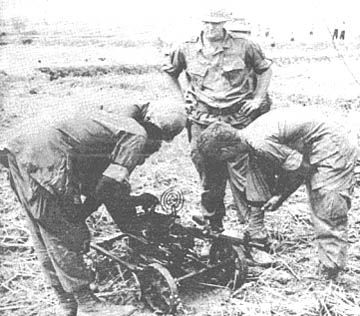 |
VC MACHINE GUN- A captured Viet Cong heavy anti-aircraft machine gun receives close inspection by members of the 2nd Bn, 34th Armor, 25th Inf Div, who captured it in a battle 54 kms northwest of Saigon. (Photo By SP5 Gary Johnson) |
INF, ARMOR, AIR IN TWENTY HOUR FIGHT
NETS 87 VC KILLED
CU CHI - Three 25th Inf Div companies battled a reinforced
battalion of North Vietnamese regulars and Viet Cong killing 87 enemy and
capturing one in a 20-hour battle.
The action began when Co C of the 2nd Bn, 14th Inf, landed in a
rice paddy near a small village 54 kms northwest of Saigon, and immediately came
under heavy fire.
The company, under operational control of the 2nd Bde, called for
air and artillery support. Within minutes, two more companies had
airlifted into the area and began to battle the entrenched communist force.
When it became apparent that all civilians had deserted the
village, the area was declared a free-fire zone and all available support was
called in, a battalion spokesman said.
Air Force fighter bombers from Bien Hoa and Pham Rang struck at the
village throughout the action. The F-100 and A-37 jets flew virtually
around-the-clock missions as forward air controllers directed a series of
close-in bombing runs.
Artillerymen from three locations surrounding the village fired
more than 3,000 rounds of high explosives in support of the ground troops.
Batteries of the 1st Bn, 8th Arty, the 3rd Bn, 13th Arty, and the 6th Bn, 77th
Arty pounded the enemy reinforced bunkers.
By nightfall, a detachment of the 2nd Bn, 34th Armor, joined the
assault after a rapid advance from its position 10 kms northeast of the
battleground. Consisting of the battalion’s reconnaissance platoon, two
tanks and four carriers, the detachment charged into the enemy bunker line.
At nightfall, Air Force “Spooky” and “Moonglow”, two AC-47
flareships, illuminated the area constantly until contact was broken at 2:30
a.m. the next morning.
When asked how effective the illumination worked, SGT Edward J.
White replied, “It was just like daytime till the battle came to an end.
If I hadn’t been so sleepy, I wouldn’t have hardly known the difference,”
added White of Barberton, Ohio.
After a continuous 20-hour battle, the “Tropic Lightning”
troopers overran the well fortified enemy bunkers. “The suspense of what
was behind that perimeter was enough to keep anybody awake,” remarked SGT
Daniel C. Hatmaker of Welch, West Virginia.
In addition to the body count and detainee, four new model
Russian-made flame throwers, eight AK-47 assault rifles, one Chinese Communist
M6 rifle, numerous documents, one RPG-2 rocket launcher, various small arms
ammunition, and clothing were also captured.
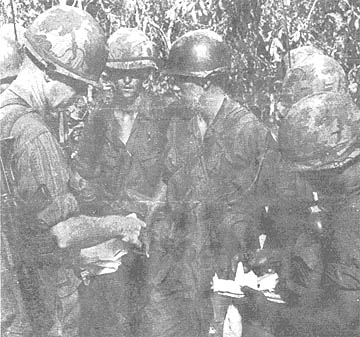 |
ENEMY DOCUMENTS - Troops of the 25th Inf Div’s 2nd
Bn,
14th Inf, sort enemy documents captured in a 20-hour battle 54 kms northwest of Saigon that resulted in 87 Viet Cong killed. (Photo By SP4 Marty Caldwell) |
| RPG-2 ROCKET - SGT Danny C. Hatmaker of Welch, W. Va., carefully examines a loaded RPG-2 rocket launcher he found in an enemy-held village the 25th Inf Div’s 2nd Bn, 14th Inf, had overrun after a 20-hour battle. The Operation Quyet Thong infantrymen killed 87 Viet Cong in bitter, close-in fighting. (Photo By SP4 Marty Caldwell) | 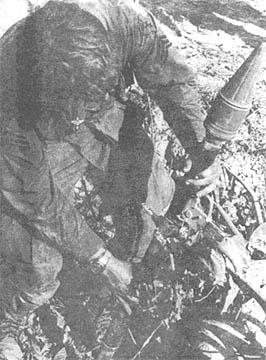 |
Rice to Orphanage
‘Bobcats’ Find Base Camp, Cache
2ND BDE - Operation Quyet Thang infantrymen of the 25th Inf Div
uncovered and destroyed an enemy regimental base camp recently as they searched
a wooded area near the Saigon River, 48 kms northwest of Saigon.
The Viet Cong complex, located by two companies and the
reconnaissance platoon of the 2nd Bde’s 1st Bn (Mech), 5th Inf, contained more
than 80,000 pounds of rice and hundreds of pounds of explosives.
According to LTC Thomas C. Lodge of Deland, Fla., his troops
arrived at the enemy installation only hours after the Viet Cong had abandoned
it.
“We came here looking for a fight,” Lodge said, “but we hurt
Charlie without having to fight him.”
The complex contained more than 375 bunkers, mess halls, sleeping
quarters, fighting positions and command posts. There was even a barber shop in
the installation.
In addition to the rice, Lodge said, his men found hundreds of
pounds of canned goods, peanuts, beans, sugar, dried fish and cured meat.
The battalion commander added that much of the rice was later
evacuated for donation to an orphanage in Saigon.
The “Bobcats”, under the operational control of the 3rd Bde,
destroyed thousands of booster charges for mortars and rocket launchers, 50 mortar
high explosives and 16 mortar gas rounds, and several 122mm rockets. The
troops also captured a 75mm recoilless rifle, which they evacuated.
Engineers later destroyed the bunker and tunnel complex.
In ceremonies in Sagion, representatives of the battalion turned
over virtually all of the captured rice to members of the Viet Hoa Orphanage.
Just A Friendly Visit
1ST BDE - A night ambush patrol recently turned from a nightmare to
a fairytale for one 25th Inf Div trooper when he was unwittingly introduced to
three Viet Cong, 8 kms north of Saigon.
PFC Charles Besser, a rifleman for Delta Co, 4th Bn, 9th Inf “Manchus”,
experienced his adventure while waiting for the point man to return from
reconnoitering the ambush site.
“I had a headache that night so I had my head down,” Besser of
Akron, Ohio, commented. “When someone nudged me I thought it was the
point man or the medic with some aspirins; that was until I looked and saw
sandalled feet - then I knew it was Charlie paying a call.
“They had the drop on me so there was nothing I could do but play
out the hand dealt,” Besser continued. “They were speaking Vietnamese,
and all the time inching down to look at my face. When he started to raise
his AK-47 I fell back yelling ‘VC’ as shots zipped past my head.”
“I opened up with my M-60 and blasted away,” PFC Jamie
Hernandez of Puerto Rico stated. “When we checked the area we found
three Viet Cong dead.”
“What saved me was the camouflage I was wearing on my helmet,”
Besser recalled. “They thought I was one of them. That was their
last hunch.”
Page 2 TROPIC LIGHTNING NEWS April 15, 1968
Decorated
| SILVER STAR | |
|
COL Edwin H. Marks Jr., HQ, 1st Brigade LTC Glenn K. Otis, HHT, 3rd Sqdn, 4th Cav LTC Ernest F. Condina, HQ, 1st Bn, 27th Inf CPT Jack R. Coyer, HHC, 2nd Bn, 22nd Inf CPT Elliot G. Fishburne III, Co C, 3rd Bn, 22nd Inf CPT Charles E. Tillson, HHB, 2nd Bn, 77th Arty CPT Lance C. Warner, Co B, 1st On, (Mech), 5th Inf 1LT Erhard P. Opsahl, Co A, 2nd Bn (Mech), 22nd Inf 1LT John J. Day, Co A, 4th Bn, 23rd Inf 2LT Steven A. Wilder, HHC, 3rd Bn, 22nd Inf 2LT John P. Garrison, Co D, 2nd Bn, 27th Inf 2LT James M. Schroeder, Co A, 2nd Bn, 14th Inf SGM Walter L. Moser, Hq & Svc Btry, 2nd Bn, 77th Arty 1SG Paul F. Simmons, Co C, 2nd Bn, 22nd Inf |
SSG Melvin J. Lewis, Co C, 2nd Bn, 27th Inf SGT David H. Moran, Co C, 3rd Bn, 22nd Inf SP5 Keith A. Lefever, Co C, 2nd Bn, 34th Armor SP5 Arthur Ruibal, Co A, 4th Bn, 9th Inf SP4 Collis C. Holcombe, Co B, 1st Bn, 5th Inf SP4 Douglas G. Barr, Co C, 2nd Bn, 27th Inf SP4 Jerome S. Adkins, HHC, 3rd Bn, 22nd Inf SP4 Thomas Volz, Co C, 3rd Bn, 22nd Inf SP4 William R. Cole, C Btry, 2nd Bn, 77th Arty PFC Charles T. Folkes, Co A, 4th Bn, 9th Inf PFC Robert A. Longford, Co A, 2nd Bn, 22nd Inf PFC James A. Waldron, Co B, 1st Bn (Mech), 5th Inf PFC Dale S. Adams, HHS Btry, 2nd Bn, 77th Arty PFC Loren G. Luth, Co C, 2nd Bn, 14th Inf |
|
DISTINGUISHED FLYING CROSS |
|
|
BG William T. Gleason, HHC, 25th Inf Div LTC Carrell W. Smith Jr, HHD, 25th Avn Bn LTC Walter E. Adams, HHC, 2nd Bn, 27th Inf CPT David B. Bradley, 2nd Bn, 77th Arty |
1LT James E. Moore, D Trp, 3rd Sqdn, 4th Cav WO1 Bruce F. Wood, D Trp, 3rd Sqdn, 4th Cav WO1 Robert P. Hose, Co A, 25th Avn Bn |
|
BRONZE STAR MEDAL (HEROISM) |
|
|
MAJ Douglas H. Farmer, HHC, 2nd Bn, 12th Inf MAJ Robert M. Brumback, HHC, 2nd Bn, 22nd Inf MAJ Richard K. Martin, HHC, 2nd Bde CPT Gerald L. Weigand, HHC, 4th Bn, 9th Inf CPT Joseph D. Szwarckop, C Btry, 7th Bn, 11th Arty CPT Dennis V. Christe, HHC, 3rd Bde CPT David L. Whidden, 3rd Bn 22nd Inf 1LT Charles A. Bennett, Co D, 1st Bn, 27th Inf 1LT John J. Ricca, Btry C, 7th Bn, 11th Arty 1LT Phillip W. Childress, Btry C, 7th Bn, 11th Arty 1LT Robert H. Slaterback, HH&S Btry, 1st Bn, 8th Arty 1LT Jay L. Hickey, Co C, 2nd Bn, 12th Inf 2LT Allan A. Lobeck, Co C, 4th Bn (Mech), 23rd Inf SGM Gale L. Foutch, HHC, 1st Bn (Mech), 5th Inf 1SG Lawrence L. Williams, HHC 3rd Bn, 22nd Inf SSG William P. Hayes, Btry C, 7th Bn, 11th Arty SSG John W. Steinbach, A Btry, 7th Bn, 11th Arty SSG Charles E. Howell, Co A, 4th Bn, 9th Inf SSG Noeldean Rhoten, Co B, 4th Bn, 23rd Inf SGT Darrell G. Dyer, Co A, 4th Bn, 23rd Inf SGT Joseph Green, Co ti, 4th Bn, 23rd Inf SGT Darrell W. Griffin, Btry A, 3rd Bn, 13th Arty SP5 Stanley J. Kjar, Co D, 65th Engr Bn SP5 Gary W. Crawford, Co D, 65th Engr Bn SP5 Edwin D. Dennis, Co D, 65th Engr Bn |
SP4 Paul B. Francis, Co B, 65th Engr Bn SP4 Roy L. Kennedy, C Btry, 7th Bn, Ilth Arty SP4 Arthur A. Wechlo, HHC, 2nd Bn, 34th Armor SP4 Timothy G. Campbell, Co A, 4th Bn 9th Inf SP4 Raymond J. Eichman, C Btry, 7th Bn, 11th Arty SP4 Larry D. King, Co A, 2nd Bn, 22nd Inf SP4 Arthur X. Tejeda, Co C, 4th Bn 23rd )nf SP4 Michael Jamilkowski, HHC, 3rd Bn, 22nd Inf SP4 Randal Bissenger, HHC, 4th Bn, 23rd Inf SP4 William J. Lavin, Co B, 2nd Bn, 14th Inf SP4 Ernest Threadgill, Co C, 4th Bn, 9th Inf SP4 Thomas K. Chang, Trp A, 2nd Bn, 34th Armor PFC Winford M. Whited, Co D, 65th Engr Bn PFC Phillip T. Jurgins, Co D, 65th Engr Bn PFC Terry L. Stoner, Co B, 65th Engr Bn PFC Michael Croke, Co A, 4th Bn, 9th Inf PFC Kenneth E. Giesing, Co C, 3rd Bn, 22nd Inf PFC Otis H. Bostic, Btry A, 3rd Bn, 13th Arty PFC Glenn E. Dunlap, Co A, 2nd Bn, 34th Armor PFC Jack E. Mosley, Co A, 2nd Bn, 34th Armor PFC Harold J. Wallace, Co A, 2nd Bn, 27th Inf PFC Barney M. Wood, D Trp, 3rd Sqdn, 4th Cav PFC Allen J. Wood, Co B, 25th Med Bn PFC William R. Steiber III, Co C, 2nd Bn, 27th Inf PFC John Jackson, Co B, 4th Bn, 9th Inf |
Become A ‘Mr’
AG Section
Have you been thinking about becoming a Warrant Officer? Then
you need to know that the Army today has a continuing need for qualified Warrant
Officers. Although the Department of the Army is very selective in
appointing personnel to this grade, do not be discouraged if you think you
qualify.
First of all, there is the Army Aviation Program, which when
completed, has commercial values if you do not remain in the Army beyond your
obligated three years. Prerequisites are outlined in AR 611-85.
Secondly, if you have been in the Army for about six or more years,
you may already be qualified to apply for a direct appointment to Warrant
Officer within your field. AR 135-100 is your guide for applying for
this type of appointment.
Department of the Army Circular 601-13, 22 Jun 67, contains a
current list of fields open to direct appointment to Warrant Officer. At
the present time, these specialties are open:
201A Meteorology Technician
421A Armament Repair Technician
441A Ordnance Shop Technician
561A Master or Mate
562A Marine Engineering Technician
621A Engineer Equip Repair Tech
062B Helicopter Pilot
671B Aircraft Repair Tech
771A Unit Personnel Tech
632A Automotive Repair Tech
741B Data Processing Tech, EAM
972A Area Intelligence Tech
And others in the guided missile field.
Unlike the Commissioned Officer, the Warrant Officer need not serve
ten years or more to be eligible to retire at his highest grade held. If
you otherwise qualify under the provisions of AR 635-130, you need only serve
your initial three year obligation as a Warrant Officer before retiring, unless
you attain the grade of CW4. If you are promoted to WC4 you must serve an
additional two years active duty after your promotion.
For additional information concerning the Army Warrant Officer
Program, see your Personnel Staff NCO, your adjutant, or contact the AG
Personnel Actions Division at Cu Chi 5511 or 5533.
Recruiting Jobs Open Stateside
• Numerous openings are now available for US Army Recruiters in
Iowa, Nebraska and South Dakota. Locations include Burlington, Cedar
Rapids, Dubuque, Waterloo, Mason City, Sioux City, Ottumwa, Fort Dodge, Council
Bluffs, Spencer and West Des Moines in Iowa; Lincoln, Grand Island, North Platte
and Omaha in Nebraska; and Aberdeen, Huron, Sioux Falls and Rapid City in South
Dakota.
• Returnees from overseas tours who are interested should see the
US Army recruiting team at Oakland or Seattle when they arrive in the U.S., or
if they miss the team contact the Sergeant Major, US Army Recruiting Main
Station, Building 63, Gruber Street, Des Moines, Iowa 50315. The
advantages include a stabilized two-year tour, opportunity for advancement
(since all vacancies are in grades E6 and E7), and a chance for the recruiter to
show what he can do in “selling” the Army while operating mainly on his own,
with minimum supervision.
• Prerequisites for recruiting duty include:
1. Be a volunteer for recruiting duty
2. GT score of 110 or higher (may be waived)
3. E-5 or above (NCO or specialist)
4. Minimum six years service (may be waived)
5. Have personal and financial affairs in good order
6. Valid military or civilian drivers license
7. Good moral character
8. High school graduate (or GED equivalent)
9. Must not be receiving proficiency pay (specialty)
10. Favorable NAC check completed or possess security clearance of
secret or higher.
ENLISTMENT OPTION FOR OVERSEAS RETURNEES
A new Army reenlistment option for overseas returnees, effective
Oct 31, 1967, permits individuals completing a normal overseas tour to reenlist
in the Regular Army for a 12-month stabilized tour for a CONUS station or area
of choice provided a requirement exists within current priorities.
Enlisted personnel in grades E-1 through E-6 serving in all
overseas areas and senior enlisted personnel in grades E-7 through E-9 serving
in Vietnam may select the new option. All DOD Lists Quarters Available to Families Of Forces in
Vietnam may select the new option. All eligible individuals, regardless of
pay grade, years of service, or time remaining on present enlistment may take a
“short discharge” for immediate reenlistment for this option.
The reenlistment term under the new option is a minimum of four
years and the reenlistment must take place no earlier than 180 days before, nor
later than 90 days before leaving Vietnam.
For further information or assistance contact your Army Career
Counselor or call CC 199.
DOD Lists Quarters Available to Families Of Forces in
Vietnam
Nearly 2,500 sets of family quarters at 18 Defense installations in
16 states are available to military families of eligible sponsors serving
unaccompanied tours overseas.
The largest number of quarters are at Schilling Manor Sub Post,
Salina, Kan., where some 730 Capehart units in the two, three and four-bedroom
categories are available.
The Reno Housing Authority at the former Stead AFB, Nev., has 645
units, which include 257 officer duplex and field grade units. In New
Mexico, the Roswell Housing Authority at the former Walker AFB, has 490 sets of
Wherry quarters, and the former Larson AFB, Wash., has 290 three-bedroom
Capehart units available.
The TROPIC LIGHTNING NEWS is an authorized publication of the 25th
Infantry Division. It is published weekly for all division units in the Republic of
Vietnam by the Information Office, 25th Infantry Division, APO San Francisco
96225. Army News Features, Army Photo Features, Armed Forces Press Service and Armed
Forces News Bureau material are used. Views and opinions expressed are not necessarily
those of the Department of the Army. Printed in Tokyo, Japan, by Pacific Stars and
Stripes.
MG F. K. Mearns . . . . . . . . . Commanding General
MAJ Hugh F. Orr . . . . . . . . . Information Officer
1LT James R. Leman . . . . . . Officer-in-Charge
SP5 Terry Richard . . . . . . . . Editor
SP5 Dave Cushman . . . . . . . Editorial Assistant
Page 3 TROPIC LIGHTNING NEWS April 15, 1968
Kuala Lumpur, Penang – Malaysia
|
|
 |
| Priest carried on palanquin in Juala Lumpur during a Chinese festival. |
Page 4-5 TROPIC LIGHTNING NEWS April 15, 1968
‘We discovered a sleeping NVA with an RPG rocket
launcher’
Photos By SP4 Earl
3RD BDE - In a series of ambushes near the
Saigon River, just 12 kms north of Saigon, a unit of the 3rd Bde, 25th Inf Div,
has accounted for 35 Viet Cong killed.
From their basecamp north of Saigon, Alpha Co, 3rd Bn, 22nd Inf,
used five high-powered skiffs and a larger gun-boat to travel up the Saigon
River where they landed and established a vise-like ambush at the mouth of a
branch river, a known enemy supply route.
“As we swept the immediate area prior to establishing our
position, we discovered a sleeping NVA soldier with an RPG rocket launcher,”
explained 1LT Michael S. Root, 4th Plt leader.
After detaining the enemy soldier, the platoon set up at the mouth
of the tributary to act as lookout.
“Shortly before midnight the first enemy sampan glided by our
position,” explained Root.
Opening fire with small arms, grenade launchers, and LAWs,
the company sank the sampan and killed all of the VC aboard. During the
course of the night, a total of four Viet Cong boats were destroyed by the
deadly effective American ambush and 22 enemy bodies were discovered.
A similar ambush on the opposite bank of the same river sent five
enemy sampans to the bottom the following night and killed 13 VC.
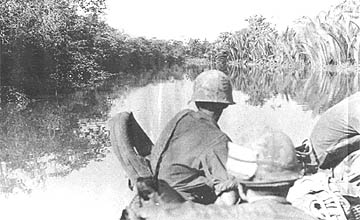 |
A patrol on a tributary of the Saigon River north of Saigon. |
| Regulars dock their Boston Whalers at an ambush site. |  |
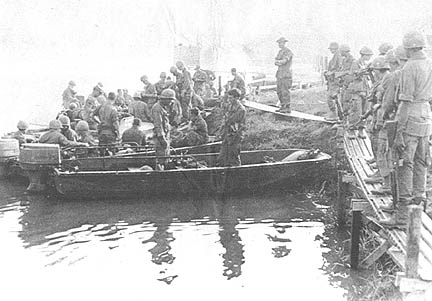 |
| Regulars prepare to board their Boston Whalers to move out on a sweep of the Saigon River. |
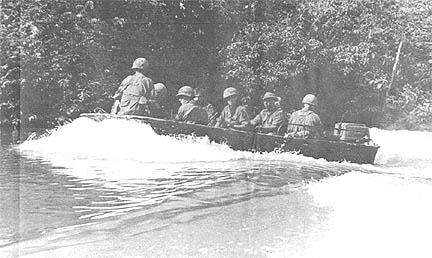 |
| The Regulars close off VC water supply routes north of Saigon on the Saigon River. |
Page 6 TROPIC LIGHTNING NEWS April 15, 1968
Saves Chopper
17th Cav Works Fast
CU CHI - When a gunship of Trp B, 3rd
Sqdn, 17th Air Cav, made a
forced landing in a rice paddy 11 kms south of the 25th Inf Div’s base camp at
Dau Tieng the cavalrymen started rescue and recovery operations that resulted in
a nearly letter perfect extraction.
The gunship was flying cover for an OH-6A Cayuse when an electrical
fire forced the pilot to make a precautionary landing in a rice paddy along the
Saigon River.
Unhurt, the four crew members managed to put out the fire while CPT
Donald Jones, piloting the ship, radioed in the coordinates of the downed ship.
Jones, of Vinegrove, Ky., landed his tiny craft to pick up the
airmen when he found out that help would not arrive for several minutes.
“The four of them came running up to my ship and started climbing
aboard,” said Jones. “The Cayuse is only made to carry two passengers
but I just couldn’t leave anybody out there, I had to try to get them all
out,” explained Jones.
Somehow everybody scrambled aboard, bringing with them two M-60
machine guns, and Jones managed to get the heavily loaded ship back to Bravo
Trp’s base camp at Tay Ninh.
Minutes later two “Hunter-Killer” teams from B Trp
arrived on the scene and dropped smoke grenades to guide the troop’s infantry
reaction force into the area.
The “Rifles”, as the troopers are called, quickly set up a
defensive position and began their task of removing the rocket pods and
dismantling the miniguns while gunships and the two Cayuses orbited over head.
One of the observation helicopters, piloted by 1LT James “Pop”
Ingraham of Madison, Ind., spotted three camouflaged sampans along the river
bank.
According to Ingraham, “My observer saw something in one of the
sampans so I brought the ship around for another look. I recognized the
bags of two North Vietnamese Army field packs so my observer dropped smoke to
mark the spot for our gunship,” he continued.
While this was going on a CH-47 Chinook was dispatched to recover
the “C” model Huey. The cavalrymen on the ground had just completed
their tasks when the Chinook came into view.
According to Ingraham, “Everything was perfect, the Chinook
arrived and made the extraction without a hitch.”
After the CH-47 departed, Ingraham’s “Hunter-Killer” team
orbited the area for a few minutes looking for Viet Cong.
“We kept an eye for any VC heading towards the recovery area and
located two Viet Cong armed with AK-47’s,” said Ingraham. “One of my
observers fired a burst with his M-16 rifle and got one of them as I called the
gunship in for a strike,” he added.
The gunship rolled in and strafed the area with rockets and
mini-guns, killing the other VC and providing a fitting end to a highly
successful operation.
‘Bravo Bandidos’ New Name For Co.
1ST BDE - A 25th Inf Div rifle company proved their right to be
called the “Bravo Bandidos” and killed one confirmed North Vietnamese
soldier while evacuating enemy supplies.
The action took place during a recent 2nd Bde reconnaissance in
force operation in the HoBo Woods. Bravo Co, 2nd Bn, 14th Inf, found the
supplies in a Viet Cong base camp.
“Half our company kept a lookout while the rest of us checked out
the bunkers,” said SP4 Bobby Lones of Lamar, Tenn.
Evacuation of items found, included 30 North Vietnamese Army (NVA)
arm bands and flags, medical pack with supplies, clothing, documents and some
small arms ammunition.
As Co B returned to their forward base camp, they were fired upon
by an estimated half dozen communist soldiers. After locating the
enemy’s position, 1LT Antonio F. Sanpere, company commander, led an assault
which forced the enemy to flee leaving one dead communist behind.
Bravo has been called “The Bandidos” since Sanpere was
appointed as company commander. Sanpere, originally from Barcelona, Spain,
recalls, “The company was already known as the “Bandits” and some of the
men just started the Spanish interpretation after I joined the company.”
“We like the name and wanted our CO to feel welcome,” stated
SSG John P. McCaffrey, “The nickname is a morale builder to the men and we are
establishing quite a record by raiding “Charlies” hideout,” added
McCaffrey of Wyandotte, Mich.
Orders Needed In Bags
SAIGON (MACV) - “Socks, shorts, toilet kit... I guess it’s all
there!”
Don’t close that bag yet, man. You forgot something very
important a - copy of your orders right on the top!
In a move to cut down claims for lost baggage and speed up recovery
of mishandled luggage, the joint services put out the word that all passengers
on MAC or contract flights will insert a copy of pertinent orders or other
authorization on the inside of each piece of baggage, on the top. The
order covers all checked and unchecked luggage.
Labels and tags on the outside of the pieces tend to become torn
off, ripped or illegible thus making it hard to identify and return to the
proper owner. The new system will eliminate the problem and help you get
the luggage in a reasonable amount of time.
Don’t wait until you get to the check-in counter to put those
orders in anymore. The time to do it is when you pack. This will
speed up processing at the check-in counter and get you on your way with minimum
delay.
So when you take that last check before closing your luggage and
moving out remember that the last piece in each item of baggage must be that
travel authorization or copy of your orders.
Page 7 TROPIC LIGHTNING NEWS April 15, 1968
|
Bobcat APCs Change Over To Diesel Fuel |
 |
| DIESEL TRACKS IN ACTION - New diesel-powered tracks of the 1st Bn (Mech), 5th Inf, maneuver across an open area. (Photo By Jake Southwick) |
2ND BDE -- “Bobcats” of the 25th Inf Div’s 1st Bn
(Mech),
5th Inf, recently put new tigers in their tanks with a conversion to
diesel-powered armored personnel carriers.
So far, the 2nd Bde’s “Mech” unit has had nothing but praise
for the high-powered, long-reaching “tracks.”
“When you stop to think about it, there are no disadvantages to a
diesel track,” said SSG Joseph L. Hendricks, the battalion motor sergeant.
“There are fewer parts to malfunction, we get greater power for Vietnam
terrain, and a diesel offers better mileage,” the Bowling Green, Ky., sergeant
noted.
According to MAJ Charles H. Gregor Jr. of Versailles, Ky., the
brigade S-4, the new personnel carriers have several major advantages over the
older, gas-powered vehicles.
“For one,” he added, “the mileage is about doubled.”
“Two, it eliminates the multi-fuel resupply problem.”
Gregor explained that armor-mechanized infantry task forces often encountered
resupply problems because the tanks needed diesel fuel and the personnel
carriers gasoline.
“Now all we have to take out to them is diesel,” he said.
Wolfhounds Kill VC LT
2ND BDE - An attempt by a Viet Cong lieutenant to scrounge food was
foiled when 25th Inf Div soldiers caught him in the act.
The action occurred as a reconnaissance platoon of the 1st Bn, 27th
Inf “Wolfhounds” conducted an operation through rice paddies 10 kms west of
Saigon.
According to 2LT Arthur T. Margrann III of Feasterville, Pa., the
platoon had just moved into a small village dotted with piles of vegetables.
The platoon’s interpreter sensed enemy nearby, and warned
Margrann.
“We noticed a man talking to a girl, so I yelled for him to come
over. He glanced over his shoulder and pretended he didn’t hear,”
Margrann recounted. “He started to move away, so I yelled again.
Finally he hopped over a berm and started to run. We fired, maneuvered
toward him, and then he yelled in English to hold fire.”
As the Americans approached, PFC Joel Goodwin noticed the man was
armed and drawing his weapon. The Texarkana, Tex., rifleman opened fire, killing
the Viet Cong.
Upon searching the body, the Wolfhounds discovered a cocked .45
caliber pistol and documents indicating he was an enemy platoon leader.
Intelligence officers who questioned the girl learned the man had
been demanding food from the villagers when the Wolfhounds moved into the other
side of the village.
STINGERS SLAY 15 VIET CONG
CU CHI - The “Stingers” gunships of the 116th Aslt Heli Co,
269th Cbt Avn Bn, killed 15 Viet Cong while operating on combat assaults in
support of the 25th Inf Div northwest of Trung Lap.
Five of the enemy were killed when the Stingers, commanded by CPT
Michael Atkinson, of Ozark, Ala., spotted several enemy in a position along the
landing zone which the Stingers were securing for troop-carrying slicks.
The slicks began to orbit the area while the Stingers rolled in and
eliminated the enemy. Several of the Viet Cong were armed with RPG rocket
launchers.
8th Aerial Port
Cu Chi Travel Bureau
SP4 Richard Patterson
CU CHI - For most soldiers of the 25th Inf Div their first and last
contact with the division base camp at Cu Chi is at the 8th Aerial Port Det.
This small outpost of the Air Force in the midst of a sprawling Army base is
responsible for the air transportation of soldiers and mail from Cu Chi to Tay
Ninh and Dau Tieng.
Through the efforts of the five men at the aerial port an average
of 300 people are processed each day. To this work load is added
approximately 6,000 pounds of mail and on some occasions emergency shipments of
fuel and ammunition are carried.
Airman First Class Carl S. Barnes recalls one load of fuel that
came in during the Tet crisis, “The bladder had just been off-loaded from a
C-130 Transport when a mortar round scored a direct hit on the fuel.”
According to Barnes, of Vicksburg, Miss., “burning fuel splashed
all over the place but the pilot managed to make an emergency takeoff and make
it out OK.”
“The biggest problem faced by the detachment and one of the most
dangerous is making sure no grenades or loaded weapons are brought aboard
aircraft,” explained Air Force Technical Sergeant William Pierce, of Charles
Town, W.Va.
The main job of the team is processing passengers and mail.
This responsibility is met with the use of C-7A Caribou aircraft that is
dispatched to the Aerial Port for its use.
“Sometimes this plane has to be used for the R&R flights
because the regularly scheduled aircraft doesn’t arrive or is delayed for a
long period of time,” Pierce said.
“Most of the delays can be attributed to maintenance or emergency
flights, such as troop lifts, that have priority over everything else,” added
Barnes.
Consequently, as most of air travelers know, there is a lot of
waiting.
Barnes described some of the efforts the airmen have tried to make
the waiting easier, “We have put books in the waiting area and the Red Cross and
Special Services have provided a variety every now and then. We even
scrounge fruit, apples and that sort of thing, from the mess hall when we
can,” Barnes continued.
“We know it’s hard waiting so we try to make it a little easier
and get the people out as fast as possible,” he added.
| DEMOLITION CHARGES - SP4 Theodore Hiracheta of Co A, 65th Engrs, exits a tunnel with detonation cord after setting demolition charges. A task force of the 2nd Bn, 34th Armor, and two mechanized infantry companies found the enemy fortifications in the northern HoBo Woods during an Operation Quyet Thong reconnaissance in force mission. | 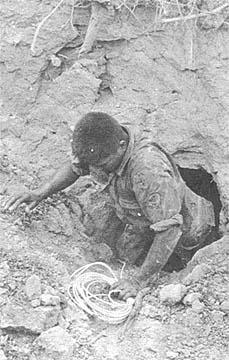 |
| Want to get a flight back to Tay Ninh or Dau Tieng from Cu
Chi? Going on Emergecy leave? Here are a few tips to save you time and aggravation. Travel through the Cu Chi air terminal, maintained by the 8th Aerial Port Det, is on a Priority-Space Available basis. As stated in MACV directives, military personnel will be booked for flights out of Cu Chi according to the following priority: I Emergency Leave. II Emergency travel, EOD teams, PAC personnel, Graves Registration personnel, etc. III Troops moving in units, Military Couriers. IV R&R groups, Transient personnel. Most travelers fall under the last category and this is on a FIRST COME FIRST SERVED basis. The terminal cannot reserve a seat and it cannot guarantee a seat to anyone. Best bet for Tropic Lightning troopers is to arrive at the terminal around 7 a.m., sign the flight manifest and wait for the plane to depart. |
Page 8 TROPIC LIGHTNING NEWS April 15, 1968
 |
BOY SCOUT - Vietnamese Boy Scouts help soldiers from the 25th Inf Div’s 1st Bde deliver 1,500 pounds of food, donated by American forces, for refugees of Long My hamlet at Dao Duc High School in Toy Ninh province. (Photo By SP4 Richard Adams) |
‘This game is for keeps’
1ST BDE - A 25th Inf Div rifleman and an enemy sniper recently
engaged in a dangerous version of “Hot Potato” which proved deadly to the
Viet Cong.
The game occurred on a 4th Bn, 9th Inf “Manchus”,
reconnaissance in force operation near Saigon.
SP4 James Kyzour, a rifleman for the Bravo Manchus who hails from
Cleveland, Ohio, switched “potatoes” with the enemy soldier while he was
pointman for his squad and received Viet Cong sniper fire.
“As bullets zipped by me I began crawling towards the source of
fire,” Kyzour recalled. “Crawling closer I could see the VC firing at
the men. Then he saw me and popped a few rounds at me. I kept trying
to get closer to get him. He threw a grenade at me that hit a log about a
foot away and rolled and hit my rifle. I frantically grabbed at it and
threw it back. A few seconds later he threw it back hitting me in the leg.
At this point I felt like laughing, only this game is for keeps,” Kyzour
commented.
“I threw it back and when nothing happened, I heaved one of my
own. This one exploded. When I checked it out, the VC was dead.
They just don’t make ‘potatoes’ like we do,” Kyzour remarked.
River Inf Mobility Fatal To VC
Thanks to
Don Casteel, 2nd Bn., 14th Inf. for sharing this issue,
Kirk Ramsey, 2nd Bn., 14th Inf. for creating this page.
This page last modified 8-12-2004
©2004 25th Infantry Division Association. All rights reserved.